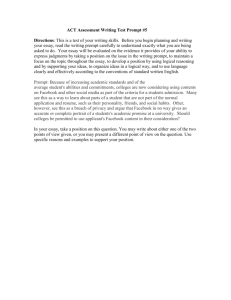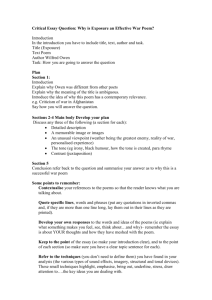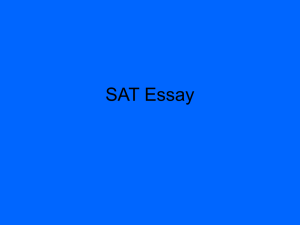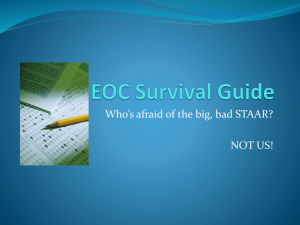AP English Literature and Composition Poetry Essay
advertisement
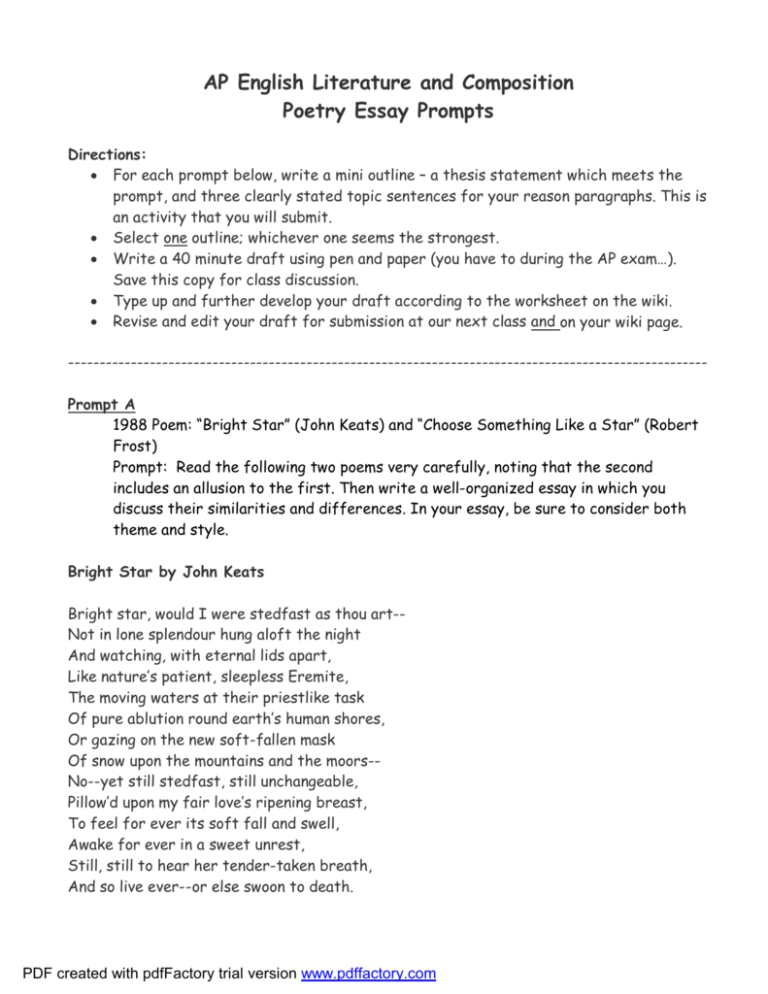
AP English Literature and Composition Poetry Essay Prompts Directions: • For each prompt below, write a mini outline – a thesis statement which meets the prompt, and three clearly stated topic sentences for your reason paragraphs. This is an activity that you will submit. • Select one outline; whichever one seems the strongest. • Write a 40 minute draft using pen and paper (you have to during the AP exam…). Save this copy for class discussion. • Type up and further develop your draft according to the worksheet on the wiki. • Revise and edit your draft for submission at our next class and on your wiki page. -----------------------------------------------------------------------------------------------------Prompt A 1988 Poem: “Bright Star” (John Keats) and “Choose Something Like a Star” (Robert Frost) Prompt: Read the following two poems very carefully, noting that the second includes an allusion to the first. Then write a well-organized essay in which you discuss their similarities and differences. In your essay, be sure to consider both theme and style. Bright Star by John Keats Bright star, would I were stedfast as thou art-Not in lone splendour hung aloft the night And watching, with eternal lids apart, Like nature’s patient, sleepless Eremite, The moving waters at their priestlike task Of pure ablution round earth’s human shores, Or gazing on the new soft-fallen mask Of snow upon the mountains and the moors-No--yet still stedfast, still unchangeable, Pillow’d upon my fair love’s ripening breast, To feel for ever its soft fall and swell, Awake for ever in a sweet unrest, Still, still to hear her tender-taken breath, And so live ever--or else swoon to death. PDF created with pdfFactory trial version www.pdffactory.com Choose Something Like a Star by Robert Frost O Star (the fairest one in sight), We grant your loftiness the right To some obscurity of cloud -It will not do to say of night, Since dark is what brings out your light. Some mystery becomes the proud. But to be wholly taciturn In your reserve is not allowed. Say something to us we can learn By heart and when alone repeat. Say something! And it says “I burn.” But say with what degree of heat. Talk Fahrenheit, talk Centigrade. Use language we can comprehend. Tell us what elements you blend. It gives us strangely little aid, But does tell something in the end. And steadfast as Keats’ Eremite, Not even stooping from its sphere, It asks a little of us here. It asks of us a certain height, So when at times the mob is swayed To carry praise or blame too far, We may choose something like a star To stay our minds on and be staid. ------------------------------------------------------------------------------------------------Prompt B 1976 Poem: “Poetry of Departures” (Philip Larkin) Prompt: Write an essay in which you discuss how the poem’s diction (choice of words) reveals his attitude toward the two ways of living mentioned in the poem. PDF created with pdfFactory trial version www.pdffactory.com Poetry Of Departures by Philip Larkin Sometimes you hear, fifth-hand, As epitaph: He chucked up everything And just cleared off, And always the voice will sound Certain you approve This audacious, purifying, Elemental move. And they are right, I think. We all hate home And having to be there: I detest my room, It’s specially-chosen junk, The good books, the good bed, And my life, in perfect order: So to hear it said He walked out on the whole crowd Leaves me flushed and stirred, Like Then she undid her dress Or Take that you bastard; Surely I can, if he did? And that helps me to stay Sober and industrious. But I’d go today, Yes, swagger the nut-strewn roads, Crouch in the fo’c’sle Stubbly with goodness, if It weren’t so artificial, Such a deliberate step backwards To create an object: Books; china; a life Reprehensibly perfect. --------------------------------------------------------------------------------------------------- PDF created with pdfFactory trial version www.pdffactory.com Prompt C 1980 Prompt: Write an essay in which you describe how the speaker’s attitude toward loss in lines 16-19 is related to her attitude toward loss in lines 1-15. Using specific references to the text, show how verse form and language contribute to the reader’s understanding of these attitudes. One Art by Elizabeth Bishop The art of losing isn’t hard to master; so many things seem filled with the intent to be lost that their loss is no disaster. 5 Lose something every day. Accept the fluster of lost door keys, the hour badly spent. The art of losing isn’t hard to master. Then practice losing farther, losing faster: places, and names, and where it was you meant to travel. None of these will bring disaster. 10 15 I lost my mother’s watch. And look! my last, or next-to-last, of three loved houses went. The art of losing isn’t hard to master. I lost two cities, lovely ones. And, vaster, some realms I owned, two rivers, a continent. I miss them, but it wasn’t a disaster. ---Even losing you (the joking voice, a gesture I love) I shan’t have lied. It’s evident the art of losing’s not too hard to master though it may look like (Write it!) like disaster. ---------------------------------------------------------------------------------------------------Prompt D 1981 Poem: “Storm Warnings” (Adrienne Rich) Prompt: Write an essay in which you explain how the organization of the poem and the use of concrete details reveal both its literal and its metaphorical meanings. In your discussion, show how both of these meanings relate to the title. PDF created with pdfFactory trial version www.pdffactory.com Storm Warnings by Adrienne Rich The glass has been falling all the afternoon, And knowing better than the instrument What winds are walking overhead, what zone Of gray unrest is moving across the land, I leave the book on a pillowed chair And walk from window to closed window, watching Boughs strain against the sky And think again, as often when the air Moves inward toward a silent core of waiting, How with a single purpose time has traveled By secret currents of the undiscerned Into this polar realm. Weather abroad And weather in the heart alike come on Regardless of prediction. Between foreseeing and averting change Lies all the mastery of elements Which clocks and weatherglasses cannot alter. Time in the hand is not control of time, Nor shattered fragments of an instrument A proof against the wind; the wind will rise, We can only close the shutters. I draw the curtains as the sky goes black And set a match to candles sheathed in glass Against the keyhole draught, the insistent whine Of weather through the unsealed aperture. This is our sole defense against the season; These are the things that we have learned to do Who live in troubled regions. ---------------------------------------------------------------------------------------------------- PDF created with pdfFactory trial version www.pdffactory.com Prompt E 1982 Poem: “The Groundhog” (Richard Eberhart) Prompt: Write an essay in which you analyze how the language of the poem reflects the changing perceptions and emotions of the speaker as he considers the metamorphosis of the dead groundhog. Develop your essay with specific references to the text of the poem. The Groundhog by Richard Eberhart In June, amid the golden fields, I saw a groundhog lying dead. Dead lay he; my senses shook, and mind outshot our naked frailty. There lowly in the vigorous summer His form began its senseless change, And made my senses waver dim Seeing nature ferocious in him. Inspecting close his maggots’ might And seething cauldron of his being, Half with loathing, half with a strange love, I poked him with an angry stick. The fever arose, became a flame And Vigour circumscribed the skies, Immense energy in the sun, And through my frame a sunless trembling. My stick had done nor good nor harm. Then stood I silent in the day Watching the object, as before; And kept my reverence for knowledge Trying for control, to be still, To quell the passion of the blood; Until I had bent down on my knees Praying for joy in the sight of decay. And so I left; and I returned In Autumn strict of eye, to see The sap gone out of the groundhog, But the bony sodden hulk remained. But the year had lost its meaning, And in intellectual chains I lost both love and loathing, Mured up in the wall of wisdom. PDF created with pdfFactory trial version www.pdffactory.com Another summer took the fields again Massive and burning, full of life, But when I chanced upon the spot There was only a little hair left, And bones bleaching in the sunlight Beautiful as architecture; I watched them like a geometer, And cut a walking stick from a birch. It has been three years, now. There is no sign of the groundhog. I stood there in the whirling summer, My hand capped a withered heart, And thought of China and of Greece, Of Alexander in his tent; Of Montaigne in his tower, Of Saint Theresa in her wild lament. PDF created with pdfFactory trial version www.pdffactory.com


